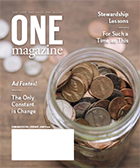
February-
March 2018
Stewardship
Lessons
------------------
|






Stewardship Lessons
By Clint Morgan
From the Word
The late C.S. Lewis stated, “Every faculty you have, your power of thinking or of moving your limbs from moment to moment, is given you by God. If you devoted every moment of your whole life exclusively to His service, you could not give Him anything that was not in a sense His own already.” This statement is a clear summation of the primary truth revealed in Psalm 24:1, “The earth is the Lord’s and the fullness thereof, the world and those who dwell therein.”
The word stewardship comes from the Greek word oikenomous, which refers to one who manages a household but does not own it. Managing a household implies being responsible for the house itself and the well being of those in that dwelling. Everything belongs to God. We are simply called to be stewards of what He has entrusted to us. At this point, our possessions and our faith intersect.
From My Parents’ Example
One aspect of good stewardship is tithing on all that has been entrusted to us. I recall with convicting clarity my parents’ commitment to practicing good stewardship by always setting aside their tithe before they spent any of their paycheck.
Mom had a little slot in her coin purse where she put tithe money after getting paid. I assure you, I don’t know of anything that would cause her to take that money and use it for any purpose other than the offering at church. Dad did not make a show of it, but every Sunday he was the first to drop his tithe and offering envelope in the collection plate. I saw it and it marked me in a very positive way.
Our family was far from wealthy. If we weren’t poor, we could see it from where we lived. My parents were involved in a church-planting project, and the salary was incredibly small. Dad picked up odd carpentry jobs to provide for us. Mom took on babysitting jobs to add a bit more to the family funds.
On one occasion, we absolutely did not have enough food in our house to prepare a meal. I asked Mom to take some of the money from that “little slot in her coin purse” to buy some groceries. It seemed reasonable to me. Surely God would not be angry if we took just a little of the tithe money to feed the family.
Mom refused to take “what belonged to God” for any purpose other than that for which it was consecrated. That moment left me a bit angry with my mom, and in all truthfulness, at God also. I walked away perplexed and frustrated. But God saw the dilemma we faced and chose to respond to our need. That very day, a check from a supporter arrived in the mailbox, and we were able to buy much-needed groceries.
I walked away from that experience with a solid lesson: whatever has been set aside for God is His; don’t use it for any other purpose. To me, Mom and Dad demonstrated a great example of biblical stewardship.
From an African Proverb
I heard the following parable in a message in Côte d’Ivoire, Africa: Doumote and his family had experienced a very good year. Life in Africa is always full of challenges, but this year had been one of great blessings. If a man can feed his family, it is a noble accomplishment. This particular year, the harvest was plenteous, no serious illness plagued the family, the livestock was healthy and multiplied, and he and his wife sold many things at the market.
The king ruling over the area was a good man. Doumote had much respect for the king because he had brought peace and prosperity to the area. In his mind, the king’s power caused the spirits to show favor to the people. To express his appreciation, Doumote decided to give the king a gift.
He pondered the matter for a while. Eventually, he chose a large, red rooster. Confident his gift was an adequate expression of honor and appreciation, he entered the king’s courtyard. He announced his presence in the customary manner—clapping his hands and saying
ko-ko (the equivalent of our knock-knock).
The king and his small entourage of village elders warmly received Doumote. The elders spent most of their time with the king, advising him when problems or questions arose from the villagers, or even from strangers visiting the village.
As custom dictated, Doumote went through traditional greetings before stating the purpose of his visit. When the chief asked, “Did you come in peace?” Doumote recognized the signal he could now express his thanks to the king. Doumote stood proudly and addressed the king. His son Hon-kpere stood beside him, dangling the rooster upside down by its feet. Doumote declared, “Honorable king, I come in peace today. I have come to express my thanks for all you have done for my village and my family, in particular. This has been a wonderful year for us. The crops were bountiful; the livestock multiplied; the family health was very good; we sold many things in the market and were able to buy things we desired. I want to sincerely thank you for being such a wonderful king. You are loved, respected, and appreciated by all. To express my appreciation, I offer you this beautiful, red rooster.” At this point, Hon-kpere humbly offered this most-prized rooster to the king.
A moment of silence fell over the crowd that had slowly gathered. When the king spoke, his words sent chills through the listeners. He sternly declared to Doumote, his elders, and all listening, “So, Doumote, you have had a prosperous year and you decided to bring me, the king, a gift of appreciation. Your crops were bountiful; your livestock multiplied; your family health was very good; you sold many things in the market and were able to buy things you desired. For all this you bring me a rooster? You bring the king a rooster as a gesture of thanksgiving for all I have done for you?”
Everyone knew the king was not pleased. He continued, “Elders, take this man and have him flogged! I want you to beat him severely. How dare he come to the king with such a gift? A rooster to express all I supposedly have done for him! He recognizes the good I have done, and then brings me one rooster to say thank you? Is this really acceptable? Is this really a gift for a king?”
Why was the king insulted by the gift? Was this really an inappropriate gift to express appreciation for all the king had done for Doumote?
A question for our reflection: are we offering a “rooster” to the King of Kings as an expression of our appreciation for all He has done for us? Are we victims of the fallacy of ownership? Do we give, from our prosperity, gifts worthy of a King? Or, are we like Doumote—greatly blessed, yet failing to properly express thanks for our blessings?
Good stewardship is not only about what we give, but also why and how. If we are to bring honor and glory to God through good stewardship, our motivation for giving must be addressed. According to 2 Corinthians 9:7, “Every man according as he purposeth in his heart, so let him give; not grudgingly, or of necessity: for God loveth a cheerful giver.”
So, let’s practice good stewardship by presenting our tithes and offerings to Him willingly and with joyful hearts. This is God’s means to provide the resources to achieve His plan, through His people, on His earth.
About the Writer: Clint Morgan has been general director of International Missions since 2011. Learn more: www.fwbgo.com.
|
|

